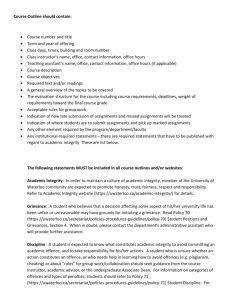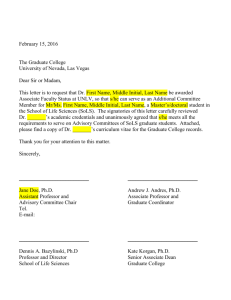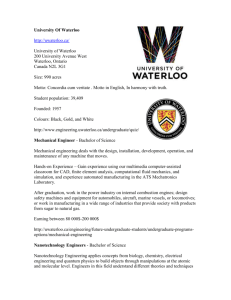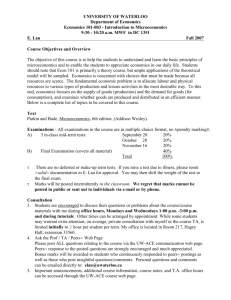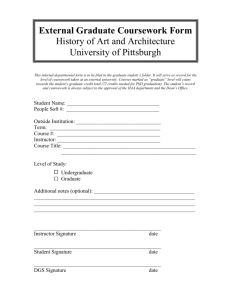Academic Integrity Workshop (ppt)
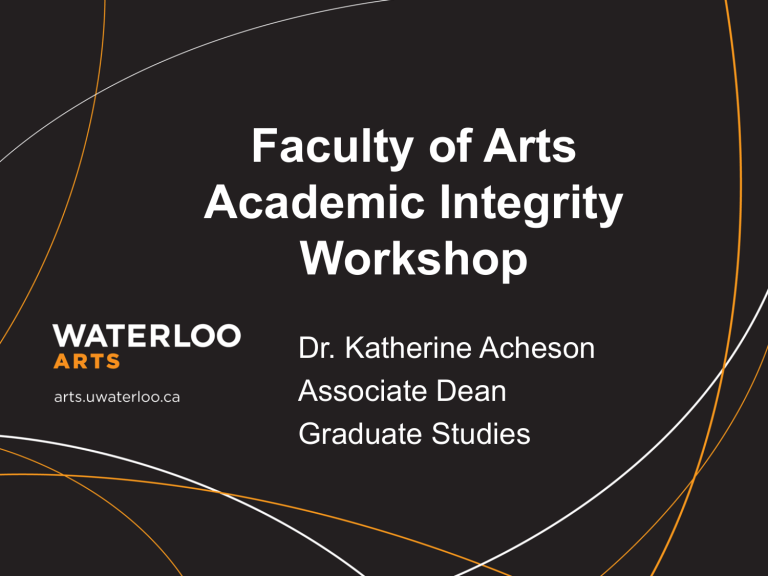
Faculty of Arts
Academic Integrity
Workshop
Dr. Katherine Acheson
Associate Dean
Graduate Studies
What is Academic Integrity?
Academic integrity is a shared commitment to honesty , fairness , and responsibility in our work as students, teachers, researchers and administrators.
It is a core value of the University of Waterloo.
Failure to uphold academic integrity affects the entire university community, including past graduates.
From the uWaterloo Office of
Academic Integrity
“A person displaying Academic Integrity always works to the highest standard of honesty in academic-related situations. S/he will never take credit for the work or ideas of others by always properly attributing and acknowledging all sources of information. S/he will not falsify documents, information, or data, and does not jeopardize the education of others by providing answers to them.” http://uwaterloo.ca/academic-integrity/
Two requirements at uWaterloo
1. Attend this workshop
• Read information sheet. Sign form (write legibly, include first and last name, program, student ID#)
• Make sure you hand the signed form in.
2. Take an online tutorial
(Graduate AIM) module and quiz.
Why this workshop?
• Over the past several years, cases of academic misconduct have increased.
• Including at the graduate level
• Including here at uWaterloo
Why more cases now?
• The internet and social norms
• Confusion, ignorance, don’t know the rules
• Cultural differences, including home/work/university environments
• Stress, panic
• Overvaluing grades; undervaluing learning
Kinds of academic offences
Plagiarism : “presenting, whether intentionally or not, the ideas, expression of ideas or work of others … as one’s own in any work submitted whether or not for grading purposes .”
From uW Policy 71, https://uwaterloo.ca/secretariat-generalcounsel/policies-procedures-guidelines/policy-71
Kinds of academic offences, cont’d.
• Cheating on exams, assignments, work term reports, or any other work used to assess performance
• Obtaining by improper means exams, tests, essays, presentations or other materials that will be submitted for assessment (“improper means” include borrowing, stealing or buying)
Kinds of academic offences, cont’d.
• Submitting a piece of work that includes major sections from previously assessed work without the permission of all instructors involved and/or without acknowledging that this work has received prior credit, including publication
Kinds of academic offences, cont’d.
• Falsifying academic records, or submitting false credentials such as transcripts or reference letters
• Impersonating another student
Non-academic offences related to academic integrity
Upholding academic integrity means:
• Respecting the rights and property of others.
• Allowing for the peaceful and safe enjoyment of the University campus and facilities.
• Abiding by University policies, municipal bylaws, and provincial and federal legislation.
Types of non-academic offences covered by Policy 71
• disruptive , dangerous, aggressive or threatening behaviour, including by electronic means
• infringing unreasonably on the work of others
• violation of instructor’s communicated rules, such as prohibition of recording lectures
Types of non-academic offences covered by Policy 71, cont’d
• violation of safety regulations in a laboratory or other setting
• unauthorized use of equipment , material or a facility or service
Case 1
• A student is working on a take home exam which involves responding to questions based on a set reading list. The student uses her computer to check the internet for definitions of terms. She has explicitly been told that students are not allowed to use secondary sources while completing the exam.
Case 2
• In a graduate course one assignment asks students to summarize a critical article. A student incorporates a high proportion of sentences verbatim in her summary without putting those sections in double quotation marks.
Case 3
• A group of students writing a take-home examination work together on the examination and include the results of their collaborative work in their examination answers. The students are in a program that encourages collaboration on term assignments but on the examination they have been instructed to “work alone.”
Case 4
• A graduate student is aware that his/her writing is terrible, so he/she hires an editor to rewrite parts of the dissertation. He/she does not acknowledge the use of an editing service.
• The same would apply if the student had asked a friend or family member to do the editing.
• More information here: https://uwaterloo.ca/graduatestudies/thesis/thesis-regulations/editinggraduate-theses
Case 5
• A student uses a data set that s/he did not prepare and without the permission of the person who did prepare the data.
Case 6
• Part of one student’s research involves interviewing people about their experiences of X. The student presents the results of his research at a colloquium. Later it is determined that he did not interview as many people as he claimed.
Case 7
• A student submitted as his final assignment work completed by another individual that had been accepted for publication but that was not yet published.
Case 8
• A student is desperate to complete an assignment and looks at his roommate’s computer to see what she has done so far on the same assignment. Some of that material ends up in his submitted work.
Graduate AIM
• Online tutorial and quiz
• Credit/non credit course on transcript
• Must be completed within six weeks of the start of term
• Must pass with 75% or more
How to access Graduate AIM
• https://www.youtube.com/watch?v=jjlYOiR
Bqyk
Policy 71
“Student Discipline”
All university policies are available through the
Secretariat’s website. https://uwaterloo.ca/secretariat-general-counsel/
How offences are handled:
Informal process
• Informal resolution by instructor
• Process must begin 10 working days after detection of the offence
• Process is initiated by the Instructor
• Report goes from Instructor to the Associate
Dean, Grad Studies
• Informal resolution must be approved by
Associate Dean and filed with the Secretariat
Formal process
• If informal resolution is not possible
• Associate Dean informs the student in writing of the allegation
• Student has five days to respond in writing
• Associate Dean conducts thorough investigation and reaches a decision.
• Filed in the Secretariat and goes on record.
Possible penalties
• Reprimand
• Failing grade
• Disciplinary probation
• Restraining order
• Revoking a degree or expunging grades
• Suspension for a maximum of three years
• Permanent expulsion
Policy 33 – Ethical behaviour
Policy 33 reinforces the provisions of the Ontario Human Rights Code and the Workplace Safety Act.
Policy 69 – Conflict of Interest
Policy 69 prohibits the inappropriate use of university students for financial gain.
Policy 73 –
Intellectual Property Rights
This policy stipulates that the creator of the intellectual property retains the exclusive rights to it.
Policy 70 –
Student petitions and grievances
This policy provides students with a procedure for grieving if s/he believes that an academic decision made by a university member has been unreasonable or unfair.
Policy 72 – Student appeals
• A formal appeal of any decision made under
Policy 70 (Student Petitions and Grievances),
Policy 71 (Student Discipline), or Policy 33 is possible.
• Your rights and the process are set out in
Policy 72.
• You must file an appeal within 10 working days of notification of the first decision.
Why do we care?
• We want you to be proud of your achievements and proud of your university.
• We want our intellectual community to model the kind of equity, fairness, and justice that are the foundations of a civil, productive society.
• We want each of you to have an equal, fair, and just opportunity to succeed .
Want more information?
• Consult your professor and/or the graduate officer in your department.
• Familiarize yourself with the policies, which can be found on the Secretariat website.
• Consult the Office of Academic Integrity website.
• Consult the Associate Dean (me).
